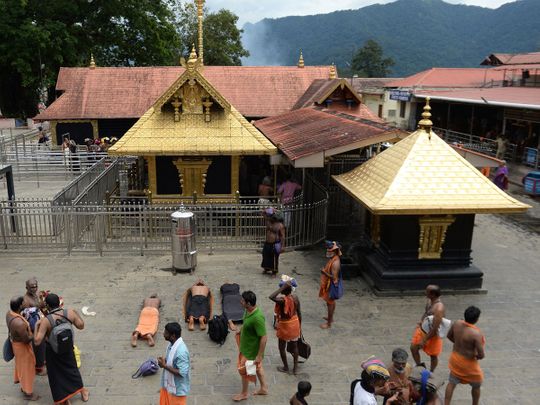
New Delhi: The Supreme Court on Thursday said restrictions on women in religious places was not limited to Sabarimala alone and was prevalent in other religions as well as it referred all review pleas to a larger seven-judge bench.
Chief Justice of India Ranjan Gogoi, reading the verdict on behalf of himself and Justices A M Khanwilkar and Indu Malhotra, said the larger bench will decide all such religious issues relating to Sabarimala, entry of women in mosques and practice of female genital mutilation in the Dawoodi Bohra community.
The CJI said the endeavour of the petitioners was to revive debate on religion and faith.
The apex court, by a majority verdict of 4:1, on September 28, 2018, had lifted the ban that prevented women and girls between the age of 10 and 50 from entering the famous Ayyappa shrine in Kerala and had held that this centuries-old Hindu religious practice was illegal and unconstitutional.
Women entry not limited to Sabarimala but also includes other faiths
The Supreme Court said that the entry of women into places of worship is not just limited to the Sabarimala temple but also includes issues like allowing Muslim and Parsi women to enter religious practice.
Reading out the judgement, Chief Justice of India (CJI) Ranjan Gogoi stated that issues such as Muslim women's entry into mosques, right of Parsi women who married outside the community to access towers of silence etc, have been referred to a larger bench.
A Constitution Bench led by CJI Ranjan Gogoi referred to a larger constitution bench a batch of review petitions against its September 2018 verdict allowing entry of women of all age groups into the Sabarimala temple.
The split 3:2 verdict saw Justice Rohinton Fali Nariman and Justice DY Chandrachud dissenting.
The bench passed the order on a clutch of petitions seeking reconsideration of its September 2018 judgement that lifted the bar on menstruating women from worshipping in the Sabarimala temple in Kerala.
The apex court in a landmark 4:1 ruling had set aside decades-old restrictions on the entry of women of age between 10 to 15 years inside the temple.
One of the five Judges, Justice Indu Malhotra had, however, dissented and ruled that judges should not impose their personnel views.
The verdict had sparked a series of protests across the state. This lead to the filing of 65 petitions seeking review of the top court's order. The petitions challenged the authority of the court to intervene in a belief of the people.
It argued that the Sabarimala deity is a "Brahmachari" (celibate) and "centuries-old beliefs" should not be disturbed by the entry of menstruating women worshippers.
A brief timeline of the Sabarimala Temple Case
1990- A petition was filed in the Kerala High Court seeking a ban on entry of women inside the Sabarimala temple.
1991- The Kerala High Court had upheld the restriction of women of certain age entry inside the holy shrine of Lord Ayyappa.
2006- A petition was filed in the Supreme Court by the Indian Young Lawyers Association seeking entry of women between 10 to 50 years.
2008- The matter was referred to a three-judge bench two years later.
January 2016- The court had questioned the ban, saying this cannot be done under the Constitution.
April 2016- The United Democratic Front government of Kerala led by Chief Minister Oomen Chandy informed the SC that it is bound to protect the right to practice the religion of Sabarimala devotees.
November 7, 2016- The Kerala Government had told the Supreme Court that it was in favour of allowing women inside the sanctum sanctorum of the temple.
2017- The Supreme Court referred the case to the Constitution bench.
September 2018- A five-judge bench of Supreme Court allowed the entry of women of all ages in the revered shrine. The state government sought time to implement the verdict, however even after the entry was allowed a large number of followers camped outside the shrine prevent the entry of women of all ages.
February 2019- The order was reserved by the Apex court. The order expected to be announced today is likely to uphold or set aside the 2018 order.
Meanwhile, this year, the temple is being opened for the three-month-long annual pilgrimage on November 16.
Travancore Devaswom Board (TDB) president A Padmakumar on Wednesday said the state government and the Board are committed to implementing the Supreme Court's verdict on a batch of review petitions challenging the entry of women of all ages in Sabarimala temple.












